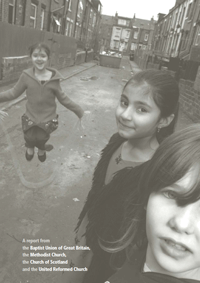Truth and Lies About Poverty - New Church Report 'Ends Comfortable Myths About Poverty'
Evidence and statistics have been misused, misrepresented and manipulated by politicians and the media to create myths that blame and stigmatise the most vulnerable in society, according to a new, hard-hitting church report
The report, entitled The lies we tell ourselves: ending comfortable myths about poverty, was published today (Friday, 1 March) by the Joint Public Issues Team on behalf of the Baptist Union of Great Britain, the Church of Scotland, Methodist and United Reformed Churches.
13 million people - including 3.6 million children - live in poverty in the UK today, and the report confronts the most common myths told about people who are in poverty or in receipt of benefits.
It said these myths blame the poor for their poverty, are reinforced by the media and many politicians, believed by many people, and are used to shape the debate over welfare policy.
One such myth is that people in receipt of benefits are lazy and don't want to work, as evidenced in the recent 'shirkers v strivers' debate. In reality, according to the report, the majority of children in poverty are from working households. In work poverty is now more common than out of work poverty.
Another is they are 'on the fiddle', with more than 80 per cent of the UK population believe that "large numbers falsely claim benefits".
However, benefit fraud has decreased to historically low levels - 'the kind of levels that the tax system can only dream of'. Less than 0.9 per cent of the welfare budget is lost to fraud.In terms of evidence being misused, it highlighted the 2011 launch of the Troubled Families programme, the government's plan to tackle disruptive families.

At the time Prime Minister David Cameron referred to 120,000 families plagued by drug addiction, alcohol and crime. However, for the family to be counted as troubled, they had to exhibit certain characteristics - which didn't include a measure for drug abuse, criminal behaviour or alcohol abuse. The largest shared characteristic was that the mother had mental health problems. The 120,000 figure was also 'highly misleading' - it was based on data collected in 2004, and had a margin of error of plus or minus 200,000.
The churches are sending the report to every MP and member of the Scottish Parliament.
People are also being encouraged to write to their parliamentary representative asking how they will use the information better to inform policy making - and ask them to commit not to use language which stigmatizes people in poverty.
'It would be comfortable for many if we lived in a society where poverty only visited families that were lazy or made bad decisions,' said Paul Morrison, Public Issues Policy Adviser and author of the report.
'That is the story these myths lead us to believe; but that's not the Britain we live in today. It's convenient to believe that benefits are too generous. It's convenient to believe that claimants are on the fiddle or even more absurdly caused our economic troubles. But it's just not true.
'The very least the most vulnerable in our society deserve is to be spoken of truthfully and with respect, and that is what we should demand from our politicians and newspapers. Anything less is to be complicit in a great injustice.'
In their work the Churches have been inspired by the words of the Biblical prophet Isaiah:
Justice is turned back,
and righteousness stands at a distance;
for truth stumbles in the public square,
and uprightness cannot enter. Isaiah 59:14 (NRSV)
They state they while they recognise these are difficult economic times, the least the poor can expect is that their positions are reflected accurately.
The report concludes, 'As a coalition of major British Churches, we want to create a new story; one grounded in truth, compassion and hope.
'Part of our calling as Christians is to seek after truth, and that means facing up to our own blindness as well as calling others to account.
'Collectively we have come to believe things about poverty in the UK which are not grounded in fact. We need to develop an understanding of the depth and breadth of UK poverty that is compatible with the evidence available.
'Just as importantly we need to match the language of public debate with the reality of people's lives.
'It is a task we must approach with humility; one which puts the lived experience of poverty at its heart, and one which is committed to truthfulness - no matter how uncomfortable we find those truths to be.'
In response, a spokesperson for the Department for Work and Pensions told The Baptist Times, 'There is an ongoing debate about the state of the current benefit system, but we are always very clear that it is the system that is failing individuals - not the other way around.
'Currently people are being trapped in dependency or are missing out on the support they are rightly entitled. Our reforms will end the benefits trap, but will also make it easier for people to claim the help they need.
'This Government remains committed to eradicating child poverty, but we want to take a new approach by tackling the root causes including worklessness, educational failure and family breakdown.'
The spokesperson added that the latest statistics show there was a reduction of 300,000 children living in relative income poverty.
However this is largely due to a fall in median income and there has been no real change to their lives. That is why the Government has been consulting on a new multidimensional measure of poverty, which includes income but also wider measures to tackle the root causes of poverty including worklessness, educational failure and family breakdown.
For more on the JPIT report, visit
www.jointpublicissues.org.uk/issues/poverty-and-inequality/